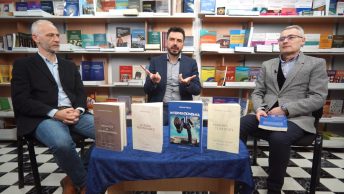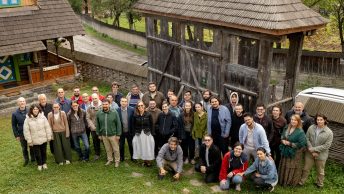http://www.lewrockwell.com/franke/franke11.1.html
The Beltway Conservative establishment has its hands full right now, not to mention pie on its face. It has to explain how Ron Paul won the presidential straw poll at this year’s just-concluded Conservative Political Action Conference (CPAC).
Lew Rockwell on von Mises, Ron Paul, Free-Markets and the Future of Freedom
Daily Bell: You have almost singlehandedly led a revolution in thought that has changed the world. How does that make you feel?
Rockwell: Well, thank you, but that’s not how ideas work. Without donors, faculty, students, collaborators, distribution media, and the division of labor, we are all just isolated scribblers. That has always been true, from the ancient world and today. We like to say that one person can make a difference, but it is only true to some extent. All forms of production, including in the world of ideas, require as much cooperation with others as possible. And while we were making great progress before 1995, the advent of digital media has made a vast difference precisely because it has dramatically expanded opportunities for communication and cooperation.
…
Daily Bell: Is the logical outcome of Austrian economics the disappearance of the state?Rockwell: Mises didn’t think so; neither did Hazlitt. Sudha Shenoy argues that of all the people who entertained the possibility of society without a state in that generation, Hayek comes closest to embodying the anarchistic temperament. In any case, the man who made the real difference in the Austrian School in this regard is Rothbard. It was he who pushed the theoretical apparatus “over the edge,” so to speak. Hardly any modern Austrian today is not an anarchist. This is also thanks to Rothbardians such as Walter Block, Hans-Hermann Hoppe, and David Gordon, of course. At one time Rothbard was denounced for his views, for having allegedly marginalized the School. Now, of course, his anarchism is probably the largest part of the legacy he left for the world. It is very appealing to young people, unlike the statism of regime economists.
…
Daily Bell: What is the future of the Ron Paul freedom movement in your view?Rockwell: This much is clear: the Paul movement has made a huge difference in bringing people to libertarian ideas. In some way, there is an element of tragedy in that it takes politics to wake people up. Ideally, people would discover the ideas of liberty through other means. Ron Paul agrees with this observation, by the way. He sees himself as an educator first. He chose politics because, for him, it was an effective route for his larger and more important goal. And what an extraordinary job he has done, in his writing and speaking and personal example for almost four decades. He has brought vast numbers of people into the light. That was always his dream. I should add that his early support was very important in the Institute’s success. We are honored to have him as our Distinguished Counselor.
Can Higher Inflation Be a Good Thing?
History seems to be repeating itself. A few days ago, a renowned economist again addressed the world and promoted an increase in inflation as being in the supposed interest of the common good. Olivier Blanchard, chief economist at the International Monetary Fund (IMF), declared that the Western world should give up its goal of limiting currency devaluation to 2 percent — and accept an inflation rate twice as high.
…
The IMF’s chief economist is not only breaking with prevailing doctrine, he is also portraying the debt policy currently practiced by the US government and Federal Reserve as a desired norm. The Fed has also started buying its own government’s bonds for want of sufficient buyers.
Zbigniew Brzezinski: How Jimmy Carter and I Started the Mujahadeen
Q: When the Soviets justified their intervention by asserting that they intended to fight against a secret involvement of the United States in Afghanistan, people didn’t believe them. However, there was a basis of truth. You don’t regret anything today?
Brzezinski: Regret what? That secret operation was an excellent idea. It had the effect of drawing the Russians into the Afghan trap and you want me to regret it? The day that the Soviets officially crossed the border, I wrote to President Carter: We now have the opportunity of giving to the USSR its Vietnam war. Indeed, for almost 10 years, Moscow had to carry on a war unsupportable by the government, a conflict that brought about the demoralization and finally the breakup of the Soviet empire.
Q: And neither do you regret having supported the Islamic [integrisme], having given arms and advice to future terrorists?
Brzezinski: What is most important to the history of the world? The Taliban or the collapse of the Soviet empire? Some stirred-up Moslems or the liberation of Central Europe and the end of the cold war?
Joe Stack and the IRS: the Christian Libertarian Response
Murray Rothbard says it eloquently: the State is “a bandit gang writ large.” As libertarians, we seek to end the institutionalized violence of the State. We envision a society characterized by voluntary interaction between individuals, where aggression is criminal and exceptional rather than commonplace and accepted. But, you may wonder, how can we possibly achieve such a society? How can we quell the cycle of violence?
Any lasting change requires changing ourselves first. Surely, more violence cannot be the means for resolving violence. We must refuse to condone this system that continually brings about strife. We do not need merely a new Congress or president, but a philosophical revolution brought about using the means of peace. Philosophical revolution brought forth at gunpoint is worth very little, but through persuasion and reason hearts and minds are transformed.




